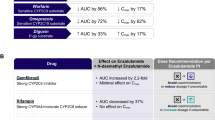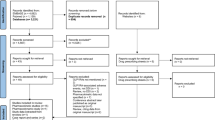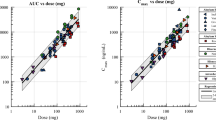Summary
Bufuralol is a beta-adrenoceptor blocking drug whose oxidative metabolism is under the same genetic control as debrisoquine and sparteine. The pharmacokinetics of bufuralol were studied in 10 healthy subjects (7 extensive and 3 poor metabolizers of debrisoquine) after oral and intravenous administration. In extensive metabolizers the systemic availability of bufuralol was 43%. Poor metabolizers were characterized by a considerable increase in systemic availability due to a corresponding decrease in hepatic first-pass metabolism. After oral administration of bufuralol non-linear kinetics may occur.
Similar content being viewed by others
References
Dayer P, Balant L, Courvoisier F, Kupfer A, Kubli A, Gorgia A, Fabre J (1982) The genetic control of bufuralol metabolism in man. Eur J Drug Metab Pharmacokinet 7: 73–77
Dayer P, Kubli A, Kupfer A, Courvoisier F, Balant L, Fabre J (1982) Defective hydroxylation of bufuralol associated with side-effects of the drug in poor metabolizers. Br J Clin Pharmacol 13: 750–752
Dayer P, Balant L, Kupfer A, Courvoisier F, Fabre J (1983) Contribution of the genetic status of oxidative metabolism to variability in the plasma concentrations of beta-adrenoceptor blocking agents. Eur J Clin Pharmacol 24: 797–799
Lennard MS, Silas JH, Freestone F, Trevethick J (1982) Defective metabolism of metoprolol in poor hydroxylators of debrisoquine. Br J Clin Pharmacol 14: 301–303
Lennard MS, Silas JH, Freestone F, Ramsay L, Tucker GT, Woods H (1982) Oxidation phenotype — A major determinant of metoprolol metabolism and response. N Engl J Med 307: 1558–1560
Dayer P, Marmy A, Leemann T, Rosenthaler J, Fabre J (1984) Interindividual variability in beta-adrenoceptor blocking drug behavior — A comparison of atenolol, bopindolol and metoprolol. Kidney Int 25: 984
Lennard MS, Jackson PR, Freestone S, Tucker GT, Ramsay LE, Woods HF (1984) The relationship between debrisoquine oxidation phenotype and the pharmacokinetics and pharmacodynamics of propranolol. Br J Clin Pharmacol 17: 679–685
Raghuram TC, Koshakji RP, Wilkinson GR, Wood AJJ (1984) Polymorphic ability to metabolize propranolol alters 4-hydroxypropranolol levels but not beta-blockade. Clin Pharmacol Ther 36: 51–56
Lewis RV, Lennard MS, Jackson PR, Tucker GT, Ramsay LE, Woods HF (1984) Timolol, atenolol and oxidation phenotype. Br J Clin Pharmacol 18: 287 P
Eichelbaum M (1982) Defective oxidation of drugs — Pharmacokinetic and therapeutic implications. Clin Pharmacokinet 7: 1–22
Boobis AR, Davies DS (1984) Multiple forms of human cytochrome P-450. Biochem Transact 12: 78–80
Minder E, Meier P, Muller H, Minder C, Meyer UA (1984) Bufuralol metabolism in human liver — A sensitive probe for the debrisoquine-type polymorphism of drug oxidation. Eur J Clin Invest 14: 184–189
Dayer P, Leemann T, Gut J, Kronbach T, Kupfer A, Francis R, Meyer UA (1985) Steric configuration and polymorphic oxidation of lipophilic beta-adrenoceptor blocking agents — in vivo-in vitro correlations. Biochem Pharmacol 34: 399–400
Evans Price DA, Mahgoub A, Sloan TP, Idle JR, Smith RL (1980) A family and population study of the genetic polymorphism of debrisoquine oxidation in a white British population. J Med Genet 17: 102–105
Haefelfinger P (1980) Determination of bufuralol and its major metabolites in plasma by high-performance liquid chromatography. J Chromatogr 221: 327–335
Eckert M, Cocco G, Strozzi C, Heizmann P, Sfrisi C (1983) Relationship between pharmacokinetic and pharmacodynamic behaviour of bufuralol and its metabolite Ro 3-7410 in hypertensive patients. Eur J Clin Pharmacol 24: 479–484
Sheiner L (1983) ELSFIT — A program for the extended least square fit to individual pharmacokinetic data. Users manual. Division of Clinical Pharmacology, University of California, San Francisco, Ca
Francis RJ, Allen JG, East PB, Ruane RJ (1976) The metabolism of bufuralol — Urinary metabolite profiles in rat, dog and man. Eur J Drug Metab Pharmacokinet 2: 113–124
Balant L, Francis TJ, Tschopp JM, Tinguely D, Estreicher J, Fabre J (1978) Pharmacocinétique du bufuralol chez l'homme. Pharm Acta Helv 53: 307–313
Francis RJ, East PB, Larman J (1982) Kinetics and metabolism of (+)-, (−)- and (±)-bufuralol. Eur J Clin Pharmacol 23: 529–533
Author information
Authors and Affiliations
Rights and permissions
About this article
Cite this article
Dayer, P., Balant, L., Kupfer, A. et al. Effect of oxidative polymorphism (debrisoquine/sparteine type) on hepatic first-pass metabolism of bufuralol. Eur J Clin Pharmacol 28, 317–320 (1985). https://doi.org/10.1007/BF00543330
Received:
Accepted:
Issue Date:
DOI: https://doi.org/10.1007/BF00543330




